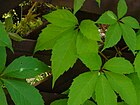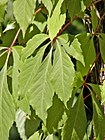Note: This is a project under development. The articles on this wiki are just being initiated and broadly incomplete. You can Help creating new pages.
Parthenocissus quinquefolia - Virginia creeper
Virginia creeper is a species of flowering plant in the grape family, Vitaceae. It is native to eastern and central North America, from southeastern Canada and the eastern United States west to Manitoba and Utah, and south to eastern Mexico and Guatemala.
Contents
- 1 Uses
- 2 Parts Used
- 3 Chemical Composition
- 4 Common names
- 5 Properties
- 6 Habit
- 7 Identification
- 8 List of Ayurvedic medicine in which the herb is used
- 9 Where to get the saplings
- 10 Mode of Propagation
- 11 How to plant/cultivate
- 12 Commonly seen growing in areas
- 13 Photo Gallery
- 14 References
- 15 External Links
Uses
swellings, poison ivy rash, jaundice, gonorrhoea, diarrhoea, fevers, Pimples, Diarrhea.
Parts Used
Chemical Composition
parthenoc issin N, trihydroxy-benzoic acid, resveratrol, oxyresveratrol, picear annol, Scripusin A, Scripusin B, parthenocissins A,cyphostemmine [1]
Common names
| Language | Common name |
|---|---|
| Kannada | |
| Hindi | |
| Malayalam | |
| Tamil | |
| Telugu | |
| Marathi | NA |
| Gujarathi | NA |
| Punjabi | NA |
| Kashmiri | NA |
| Sanskrit | |
| English | Virginia Creeper, five-leaved ivy |
Properties
Reference: Dravya - Substance, Rasa - Taste, Guna - Qualities, Veerya - Potency, Vipaka - Post-digesion effect, Karma - Pharmacological activity, Prabhava - Therepeutics.
Dravya
Rasa
Tikta (Bitter), Kashaya (Astringent)
Guna
Laghu (Light), Ruksha (Dry), Tikshna (Sharp)
Veerya
Ushna (Hot)
Vipaka
Katu (Pungent)
Karma
Kapha, Vata
Prabhava
Habit
Identification
Leaf
| Kind | Shape | Feature |
|---|---|---|
| Simple | palmate | Leaves are alternate, palmately compound with 5 leaflets, occasionally 4, rarely 3 or 7, the middle leaflet largest, up to 6 inches long |
Flower
| Type | Size | Color and composition | Stamen | More information |
|---|---|---|---|---|
| Unisexual | ¼ inch | greenish yellow | 5 | Flowers are about ¼ inch across, greenish yellow with 5 (occasionally 6) oblong-elliptic petals that are boat-shaped at the tip |
Fruit
| Type | Size | Mass | Appearance | Seeds | More information |
|---|---|---|---|---|---|
| round | 7–10 mm | Fruit is a round, blue-black berry about 1/3 inch in diameter, containing 2 or 3 seeds, maturing in late summer | many | {{{6}}} |
Other features
List of Ayurvedic medicine in which the herb is used
- Vishatinduka Taila as root juice extract
Where to get the saplings
Mode of Propagation
How to plant/cultivate
Landscape Uses:Arbor, Woodland garden. Requires a well-drained moisture retentive fertile soil[200]. Succeeds in most soils, preferring full sun but tolerating semi-shade[3]
Commonly seen growing in areas
Wood land, rocky banks, Borders of forests and fields.
Photo Gallery
References
External Links
- Ayurvedic Herbs known to be helpful to treat swellings
- Ayurvedic Herbs known to be helpful to treat poison ivy rash
- Ayurvedic Herbs known to be helpful to treat jaundice
- Ayurvedic Herbs known to be helpful to treat gonorrhoea
- Ayurvedic Herbs known to be helpful to treat diarrhoea
- Ayurvedic Herbs known to be helpful to treat fevers
- Ayurvedic Herbs known to be helpful to treat Pimples
- Ayurvedic Herbs known to be helpful to treat Diarrhea
- Herbs with fruit used in medicine
- Herbs with Roots used in medicine
- Herbs with Bark used in medicine
- Herbs with twigs used in medicine
- Herbs with common name in English
- Habit - Perennial plant
- Index of Plants which can be propagated by Seeds
- Herbs that are commonly seen in the region of Wood land
- Herbs that are commonly seen in the region of rocky banks
- Herbs that are commonly seen in the region of Borders of forests and fields
- Herbs








